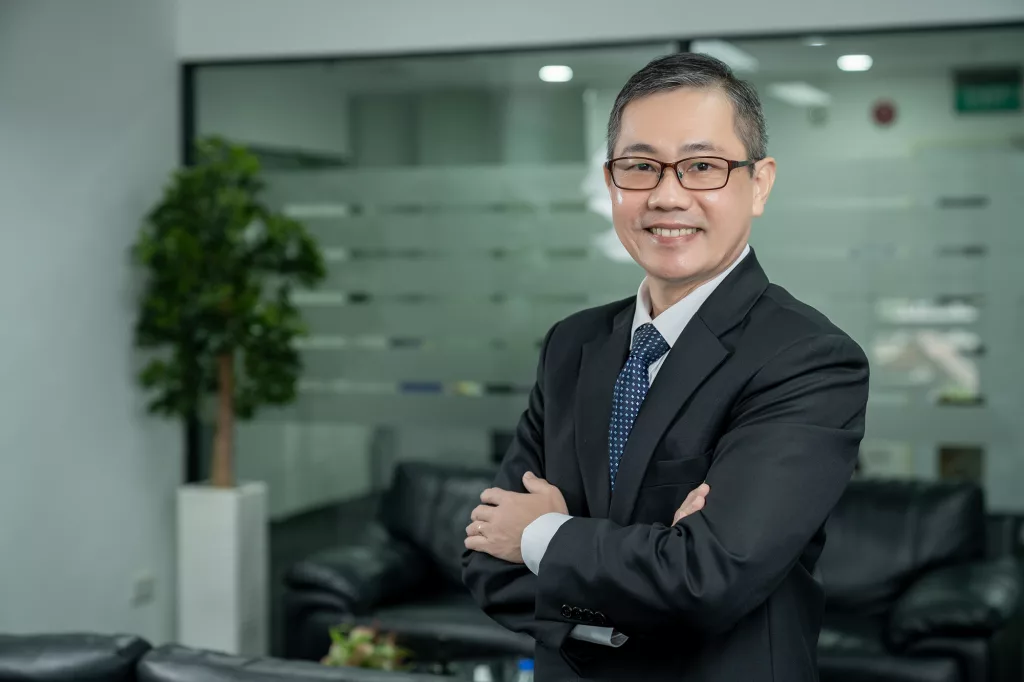Wing Bank CEO Invests in his Staff — ‘Better People = Better Organisations’
A healthy blend of leadership styles has brought personal and organisational benefits.

CEO: Han Peng Kwang
The CEO of Cambodia’s Wing Bank Han Peng Kwang, is still inspired by his career, and by the banking industry as a whole.
“The need to learn and adapt continuously is exciting to me,” he says. “Banking is a business that is constantly evolving, and that requires me to continue to learn and adapt to remain competitive and relevant.”
Banking has changed, Han Peng Kwang observes, from the traditional branch banking — which he terms Bank 1.0 — to branchless, digital banking — Bank 4.0. “There is also an emerging trend of decentralised finance that offers higher levels of security, faster transactions, and lower fees.”
He describes his leadership style as a mixture of “servant leadership” and “democratic leadership”. The former is a preference for power-sharing models of authority, prioritising the needs of the team and encouraging collective decision-making. The latter includes team members in the process by asking for their input before a decision is made.
Han Peng Kwang also incorporates “transformational leadership” in his leadership style: seeking to change the people he leads by inspiring them to innovate. “I always stress the importance of integrity to be successful in life,” he says.
Wing Bank, as an organisation, believes in successor planning: C-suite executives are assisted by their deputies — who are being trained to succeed them.
Peng Kwang assumed the position of CEO at Wing Bank in June 2021. At the time, the entity was new as a commercial bank, but established and well known as a payment service-provider. “I had had the privilege to start a commercial bank from scratch in 2009,” he says, “which was both challenging and exciting.
“It was a very fulfilling personal achievement to successfully launch a commercial bank then. In 2021, I was approached by Wing Bank to be CEO, and help them to establish the commercial banking business.” Wing had just been awarded a commercial banking licence by the National Bank of Cambodia.
“The opportunity was like déjà vu to me — and it got me very excited. The difference is that I now have the opportunity to build a commercial banking business to complement an existing business. It was already very successful and established, and excels in providing mobile financial services within a large digital ecosystem.
“In this era of digital banking, where it’s crucial to utilise the power of AI and machine-learning technologies to offer better financial services to customers, I see the potential of Wing Bank becoming a leading homegrown digital bank with the capability to serve the full spectrum of Cambodia customers, especially under-served and under-banked citizens. “That’s what motivated me to assume the role of chief executive.”
Han Peng Kwang plans to leverage the economic uncertainties of the current age to strengthen employee loyalty, and improve lives. “Wing Bank is an equal-opportunity employer,” he notes, “and an employee-focused organisation. The HR policy at Wing focuses on the holistic development of every employee, and helps to merge their career and life paths.
“‘Wingers’ are proud of their brand, and appreciative of the unconventional HR approaches that help them with life-coaching and career development at the same time. It carves them out as better professionals, and better people.
“Our training programmes are focused in that way because we believe better people make better organisations.”
You may have an interest in also reading…
Ernst & Young, Argentina: Legal Certainties in Argentina – Court Sides with Business
Sergio Caveggia and Leonardo Favaretto of EY explain the implications of the Spinna Argentina SRL case with regard to Income
Angola’s Sovereign Wealth Fund Announces Investment Policy
Asset allocation to support preservation of capital, maximisation of returns and infrastructure development José Filomeno dos Santos appointed FSDEA chairman
IFC: Corporate Governance Gains Prominence with the Forthcoming ASEAN Economic Community
One of the much-anticipated events in Asia this year is the formation of the ASEAN Economic Community which will allow
















































































